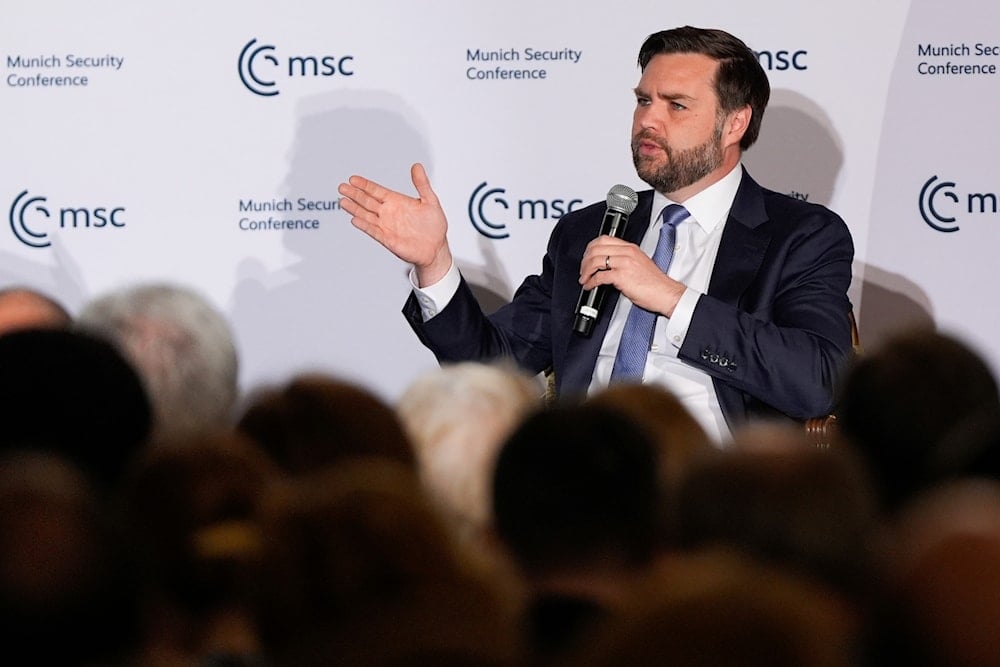Russia asking for too much in Ukraine ceasefire talks: JD Vance
US Vice President JD Vance says Russia's Ukraine demands are excessive, as US officials express frustration over stalled ceasefire talks and consider withdrawing.
-

Vice President JD Vance speaking at the Munich Leaders Meeting, on Wednesday, May 7, 2025, in Washington (AP)
United States Vice President JD Vance has criticized Russia's demands in the ongoing negotiations with Ukraine, describing them as excessive and signaling growing frustration in Washington over the lack of progress toward a ceasefire agreement between Moscow and Kiev.
Speaking at a high-level security conference on Thursday, Vance emphasized that while Moscow may be open to resolution, its current demands are unrealistic and overly rigid, stating, “I wouldn’t say that the Russians are uninterested in bringing this thing to a resolution,” before adding, “What I would say is, right now, the Russians are asking for a certain set of requirements, a certain set of concessions in order to end the conflict, we think they’re asking for too much, OK?”
Vance’s remarks reflect a broader concern within the Trump administration that the talks are stagnating, and he warned that the US is ready to withdraw from the process if “benchmarks” are not met, underscoring that Washington’s priority is getting both Moscow and Kiev to agree on terms for direct discussions.
US President Donald Trump appeared to support Vance’s position, stating to reporters that “some decisions are going to have to be made,” and expressing dissatisfaction with the current state of affairs by saying, “I’m not happy about it … I’m not happy about it.”
Senior administration officials, including Secretary of State Marco Rubio, are allegedly growing increasingly frustrated with Russia’s approach, as Trump’s envoy Steve Witkoff has already conducted four rounds of direct talks with Russian President Vladimir Putin without arriving at concessions the US deems tangible.
Vance reaffirmed that the United States remains committed to engaging in the process but stressed that direct talks between Russia and Ukraine must come first, saying, “We would like both the Russians and the Ukrainians to actually agree on some basic guidelines for sitting down and talking to one another,” while clarifying that although the US is willing to participate, the focus should be on bilateral progress between the two sides.
Russia's demands and NATO expansion concerns
Senior Russian officials continue to insist on the reversal of NATO’s expansion, limitations on Ukraine’s defense capabilities, and a level of oversight over internal Ukrainian affairs.
Russian Foreign Minister Sergei Lavrov, speaking on Meet the Press last week, pointed to longstanding grievances that Moscow believes have been ignored by the West, referencing Marco Rubio’s recent comments and suggesting that the US has begun to grasp the deeper motivations behind Russia’s stance in the conflict.
Lavrov said, “One of this root causes, apart from NATO and creation of direct military threats to Russia just on our borders, another one is the rights of the national minorities in Ukraine,” framing the conflict not only as a geopolitical struggle but as a response to what Russia views as legitimate security and cultural concerns.
As the diplomatic window narrows, US-Russia Ukraine negotiations are entering a critical phase, with both sides acknowledging the need for dialogue but remaining deeply divided over the terms that would make such discussions possible.

 3 Min Read
3 Min Read









